ROME – Two days after the Italian region centering on the city of Venice narrowly failed to adopt a liberalized law on physician-assisted suicide, Pope Francis met Italy’s best-known pro-life leader who had been a major critic of the proposed legislation.
Given that Massimo Gandolfini, founder of Italy’s “Family Day” movement, is routinely described in the Italian press as an “ultra-conservative,” the fact he was warmly received by Francis marks the latest reminder that despite the pontiff’s reputation as a progressive, he nevertheless can be surprisingly traditional on matters such as abortion, assisted suicide and “gender theory.”
The encounter came on the heels of the result in the Italian region of Veneto.
After a marathon debate Jan. 16, a vote in the regional council ended up in a tie, 25 to 25, over a proposal to require healthcare agencies to evaluate a patient’s request for physician-assisted suicide within 20 days. As a result, the measure failed to pass and returns to Veneto’s commission on health for further consideration, with most experts regarding another vote in the near future as unlikely.
The proposal had been backed by the center-left administration of Veneto on the grounds that it would streamline what has been a confused bureaucratic situation since a 2019 ruling of Italy’s constitutional court decriminalizing assisted suicide under certain circumstances.
In the absence of legislation specifying how approval is to be given at either the national or regional levels, however, many patients requesting the procedure encounter significant bureaucratic delays, and some end up traveling to neighboring Switzerland to end their lives there.
In a newspaper column ahead of the vote, Gandolfini argued that the proposal was “completely inhuman” and the triumph of what Pope Francis has called a “throw-away culture.”
“It’s necessary to underline the complete inhumanity (and incivility) that these proposed laws on assisted suicide bring with them, where palliative care is effectively ignored,” Gandolfini wrote.
“Faced with conditions of pain, suffering, loneliness, which cloud all hope to the point of evoking death, the response is social indifference, abandonment, the physical elimination of the problem, hidden behind the most shameful of alibis: ‘He asked for it!’”
“If laws are approved that favor the absurdity of the ‘right to die,’ those who will certainly pay the price will certainly be the weakest, most fragile, loneliest people and – as has happened in all the states that have already legislated in this sense – it will quickly pass from the death requested by the individual to the death decided by the state,” Gandolfini said.
In the aftermath of the vote, Gandolfini met Pope Francis in the Vatican on Thursday, where he said the pontiff was well aware of the outcome in Veneto.
“He was happy, and thanked me again,” Gandolfini said.
Gandolfini said the pope had been “very affectionate” during the meeting and responded positively when he asked for Francis’s blessing ahead of the next Family Day rally in the Rome, which is set for March.
Now 72, Gandolfini is a neurosurgeon who resides in the Italian city of Brescia. A devout Catholic and a member of the Neocatechumenal Way, Gandolfini was one of the first physicians in Italy to declare conscientious objection after abortion was legalized in the country in 1978, and his first experiences as a public leader of pro-life sentiment came three years later during an ultimately failed referendum campaign seeking to overturn that 1978 law, known as “Law 194.”
Married in 1977, Gandolfini and his wife are parents to seven adopted children – one from Peru, two from Brazil, and the other four from Italy. He’s also served as a consultant to the Vatican’s Dicastery for the Causes of Saints, providing medical analysis of purported miraculous healings in sainthood cases.
The initial “Family Day” rallies in Italy occurred in 2015 and 2016, and, at the time, there were mixed signals from the Italian bishops as to how much the initiatives enjoyed official ecclesiastical support. Nevertheless Gandolfini forged ahead, gradually winning gestures of approval from both the Vatican and the leadership of the Italian conference.
One sign of the impact of the gatherings is that a highly rated Italian television show broadcast a series of semi-satirical episodes titled “Family Day vs. Gay Pride,” styling the former as the pro-life, culturally conservative equivalent of the Gay Pride movement.









